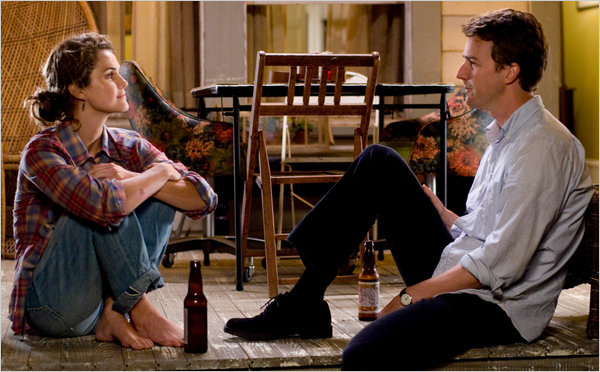|
Reviews of Recent Independent, Foreign, & Documentary Films in Theaters and DVD/Home Video

LEAVES OF GRASS Writer/director/co-star Tim Blake Nelson skewers one of the oldest gimmicks in comedy, twins separated at birth, among many clichés in an uneven and odd mix of guffaws and philosophical analysis. Classics professor Bill Kincaid (Edward Norton) is a Latin expert on the twins in The Menaechmi by Roman playwright Plautus, the inspiration for Shakespeare’s The Comedy of Errors. (Nelson was a classics major at Brown.) Bill is so intellectual that he is oblivious to the heaving breasts of a co-ed until she performs an aggressive one-on-one striptease in his office. (Bringing a cock-eyed humor to the exaggerated role, Lucy DeVito is an attractive combination of her parents Danny DeVito and Rhea Perlman.) While Bill teaches Socratic dialogue, his genial twin brother, Brady (Norton, much less recognizable in wig, tattoos, beard, and broad Oklahoma accent), sells his hydroponically raised marijuana to a couple of thugs. He has channeled his genius—which his mother, Daisy (Susan Sarandon), says surpasses his academic brother—into perfecting a strain of pot. (Brady also holds his own in lengthy philosophical colloquies with his brother, including about classic country rock.) Brady manipulates Bill to return and reenact their school daze switcheroos for a final showdown with a drug gang so he can settle down peacefully with his pregnant wife. The rest of the film wanders about as the prodigal son/fish out of water readapts to and re-appreciates his native milieu. Nelson’s acting career since O Brother, Where Art Thou? has reflected his early Oklahoma heritage (the dialogue is full of earthy local slang), and here he is Brady’s good ole boy best friend. One reason keeping Bill down home is the lovely, local prodigal daughter, Janet (Keri Russell). She quotes Walt Whitman’s Leaves of Grass and spouts her own poetry as well as catches catfish barehanded (“noodling” in the local parlance). Their talky scenes together are sweet but seem to come out of another movie, like a sodden take on Sweet Home Alabama. The twin switch is a very complicated ruse for a farcical tour through Tulsa’s Jewish community, where Nelson grew up. Richard Dreyfuss does a funny, tough turn as Pug Rothbaum, the local Meyer Lansky-type, complete with a wall-full of photographs with politicians. That these testimonials recall Michael Corleone with the senator in The Godfather: Part II is a warning about the considerable violence that surprisingly erupts. Even coming from the writer/director of the Auschwitz film The Grey Zone, the result is more crass than amusing when a large menorah is ridiculously wielded as a lethal weapon. Bill’s pastoral counsel from a female rabbi “to repair the world” doesn’t quite repair the audacious images. The most
fun is watching Norton interact with Norton in his two roles. Their
differences are so indelible that the twins seem to be actually together in
more than their six or so scenes, with no split-screen stiffness.
(Norton transitioned from one brother to the other over lunch breaks for
each scene’s filming.) In such a relatively low-budget film, there are
minimal visual effects gimmicks beyond melding camera angles, so Norton,
without a Fight Club alter-ego, creates two separate yet
identical twins beyond what
Plautus and Shakespeare probably intended.
Nora Lee Mandel
|

